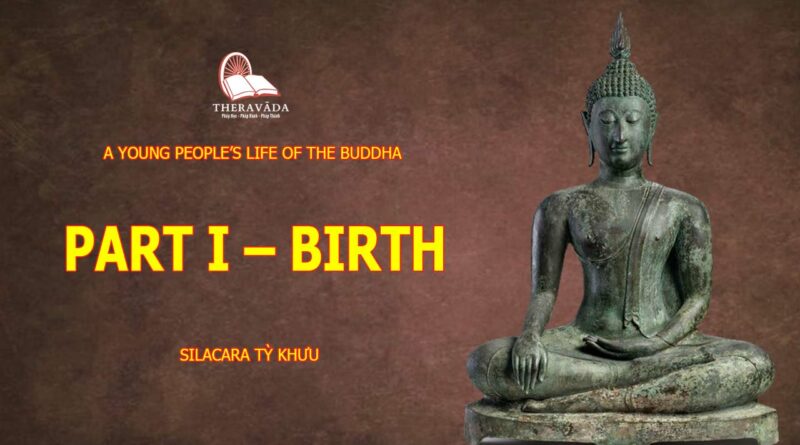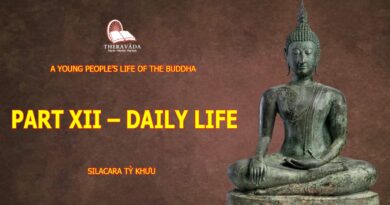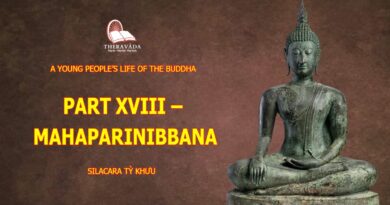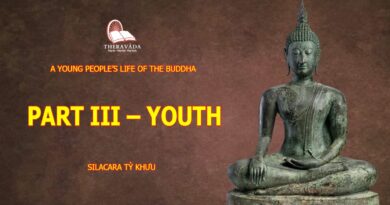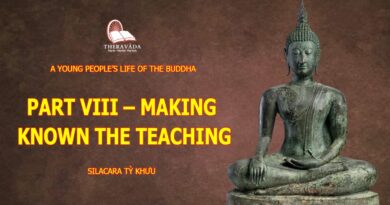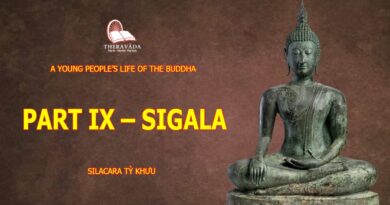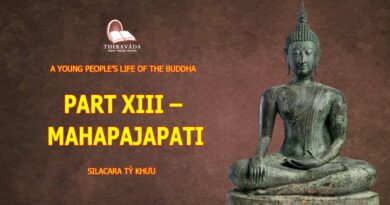A YOUNG PEOPLE’S LIFE OF THE BUDDHA: PART I – BIRTH
In times long past, fully twenty-five hundred years ago, where are now the border-lands between Nepal and the northern parts of the provinces of Oudh and North Bihar, there were a number of little kingdoms inhabited by different races of people, each ruled over by its own Raja or King. One of these little kingdoms which lay some distance north of the present-day town of Gorakhpore, on the north side of the river Rapti, was the land of a race called the Sakyas, the king who ruled over them at that time being called Suddhodana. The family to which King Suddhodana of the Sakyas belonged was called the Gotama family, so that his full name was King Suddhodana Gotama; and the name of the chief city in his kingdom where he had his chief palace, was Kapilavatthu.
This King Suddhodana had a chief queen whose name was Mahamaya. And after they had lived together for some time in married happiness, the Queen became aware that the day was drawing near when she should bring forth a child. So, before time came upon her, she asked her husband to give her leave to go and pay a visit to her own people who belonged to a city not very far away called Devadaha. King Suddhodana very willingly granted his chief Queen her wish, and sent out his men with orders to prepare the way for her, and do everything needed to make the journey to her father’s house a pleasant and comfortable one for her.
Now half way between Kapilavatthu and the town of Devadaha there was a very fine forest garden called Lumbini where the people of both places used to go in the hot weather to enjoy the cool shade of the great Sal trees of which there were many in the grove. Here in the month of May, these great trees were covered from top to bottom with lovely blossoms. In among their long branches flew many kinds of birds singing their sweetest songs so that the whole air was full of the sound of their warbling. And over and through the myriads of flowers, swarms of bees went cheerfully humming, busily gathering honey on every hand.
When, as her bearers carried her along the road to Devadaha in her royal litter, Queen Mahamaya came to this pleasant place, she thought she would like to rest there a while in the cool shade for it was a hot day, and so she told her bearers to carry her in among the trees. But she had not been there long, walking about and enjoying the pleasing sights and sounds all round her, when suddenly and unexpectedly the pangs of child-birth came upon her, and in a little while, there in the Lumbini Grove, under the Sal trees, among the birds and bees and flowers, she brought forth a son.
The place where this Lumbini Grove stood at that far off time can still be seen to-day. For a great king called Asoka, who ruled over a large part of India about three or four hundred years after King Suddhodana’s time, caused a tall pillar to be set up in the forest-garden where thus was born the son of King Suddhodana and Queen Maya of Kapilavatthu, in order to mark the place; and on it he had a writing carved in deep-cut letters which can still be read, saying that he had put it there in order that men in the future should know where the great event had taken place. And although in the course of the two thousand and more years that have passed since King Asoka set up this pillar, the upper half of it has been broken off, and the half that is left leans all on one side, it still stands to this day in the place where King Asoka put it with his inscription on it for any one to see. And many people go to see it every day.
Now on the hills outside Kapilavatthu there lived many hermits; and among them there was one old hermit whom every one in Kapilavatthu admired and esteemed for his goodness, King Suddhodana himself being especially fond of him and showing his esteem and affection for him in many ways. This old hermit, when he heard that his great friend the King now had a little son, came down to the King’s palace in the city to see the babe; and when he had come, the King asked him to give the babe his blessing, and, as he made his request, he held the infant out toward the hermit in a posture of doing homage to the old man. But the hermit said:
“Nay, Maharaja, it is not your son who should bow his head to me, but I who ought to bow my head before your son. For I see well that he is no ordinary child. I see well that as he grows up to manhood’s years he will become a very great religious teacher. Yes, I believe he will become the greatest religious teacher the world has yet seen.”
Having said this, the old man sat silent for a little while smiling to himself with a pleased and happy look. Then his eyes slowly filled with tears and he began to weep, the tears trickling down his cheeks.
“Why!” said the King in great bewilderment and some alarm, “What is the matter with you? Just a moment ago you were smiling and now you are weeping. Is anything wrong? Do you foresee some evil thing that is going to happen to my boy?”
“No, no, Maharaja,” said the hermit, “do not be alarmed. No evil thing will ever come near your son. All-prosperous shall be his name, and all-prosperous he will be.”
“Then why do you weep?” asked the King.
“I weep,” said the hermit, “to think that I am now so old I must soon pass away, and I shall not live to see your son become the great teacher I know he one day will be. You Maharaja, will live to see that great and happy day, and so will many another person now alive, but I shall not live to see it. That, Maharaja, is why I cannot help weeping.”
With these words the old man rose from his seat, and putting his two hands together, palm to palm, be bowed down before the little infant.
King Suddhodana was very much astonished at all the hermit had said and to see him bowing down his old grey head before the little baby; but he thought so much of him that he felt that he himself must do the same as the hermit had done, so he too bowed down and with folded hands, did obeisance to his own baby son.
Now in India in those days, it was the custom when a boy-baby was born, to gather together the wise men, and on the fifth day after the boy’s birth, to bathe his head and give him the name that had been chosen for him by the wise men. And this was done with King Suddhodana’s son also. The name the wise men chose for him was Siddhattha, a word which means all-prosperous or all-successful, one who will prosper or succeed in everything he sets out to do. For they said they could see that this boy was not going to be like any ordinary boy. They said they could see that if he followed the ordinary life of the world and in due time became king like his father before him, then he would become a very great king indeed. But, they said, if he did not follow his father on the throne of his country but instead turned to follow the religious life, then he would become a very great religious teacher. One of the wise men, however, spoke a little differently from the others. He said that he, for his part, was quite sure that when the boy grew up he would be certain not to follow the worldly life and take his father’s place, but would leave throne and kingdom and everything behind him, and following the religious life, become the very greatest religious teacher in the world. This particular wise man thus said the very same thing that the old hermit had said about the boy’s future.
The king, of course, was very much pleased that so many people, and these the wisest and most learned in his kingdom, should think that his little son was going to grow up to be a very great man. But he was not so highly pleased at the thought that he might not follow him upon the throne, but only become a great hermit. He wanted his son to grow up living the ordinary life of the world that every body lives; he wanted him to marry and get children; and when he himself was too old to govern the kingdom any longer he wanted to see his son mount the throne after him and rule the people as he had done, wisely and well. “And then, after a time,” he thought to himself, “who knows? Perhaps my son may, become as great a king as any that have ever been, and rule, not only over little Kapilavatthu, but over the whole of India!” Thus did King Suddhodana consider within himself; and the bare thought of such a thing happening to a son of his filled him with the greatest delight; and he resolved to do all in his power to make sure that Siddhattha should live the ordinary worldly life and never think about anything else.
But in the meantime he had cause to be anxious about something else. Ever since she had given birth to Siddhattha, Queen Mahamaya had been ill. She had never recovered her former strength. She received all the best care that a queen could get, all the best doctors, all the most skilled attendants and nurses, but in spite of everything she died just two days after the day on which her baby had been given his name, and seven days after she had brought him into the world. Every one, especially her husband the king, grieved very much at her death, for she had been a good woman and a good queen beyond most women and queens. So now the sorrowful king had to give his motherless baby into the care of his mother’s sister, Princess Mahapajapati, and she took care of him now and brought him up just as if he had been her own son. Thus the little boy Siddhattha never knew his own real mother.
Source: Budsas.net

